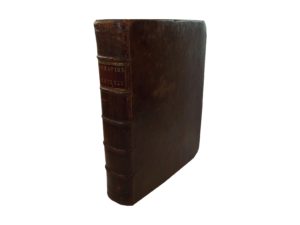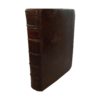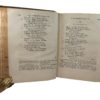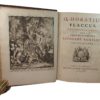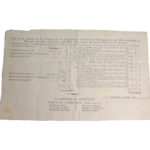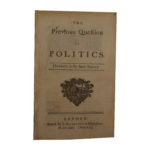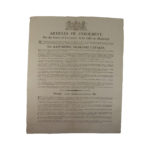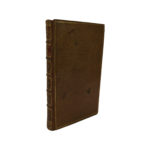Description
[000081] Q. Horatius Flaccus; (Horace); Bentleii, Richardi; (Bentley, Richard, Ed), [Opera] Q. Horatius Flaccus, Ex Recensione & Cum Notis Atque Emendationibus Richardi Bentleii – Editio Altera, Rod. & Gerh. Wetstenios, Amstelaedami (Amsterdam), 1713, Reprint, Good, Full Calf, 4to, [24], 538, [2], 539-717, [5], 5-239pp.
Contemporary full calf, raised bands, spine in six panels, leather author label to second panel. Rubbed to extremities and covers, corners bumped, ink stains to fore-edge. Internally some light browning, with signatures Nnn, Uuu and Xxx browned, occasional light damp staining to top edge, old ownership inscriptions to title.
Engraved frontispiece, title in red and black with engraved vignette.
Moss II:17 useful and creditable editions”; Dibdin II:101-105
“Bentley, Richard (1662-1742), philologist and classical scholar … Bentley’s Horace took longer still: less than a year for the text, but nearly seven for the textual notes, during part of which he stopped work altogether. In 1713 a second edition was printed in Amsterdam and a small edition in Cambridge with short notes, prepared by his nephew Thomas Bentley, who became a fellow of Trinity in the following year. A few days after its initial publication Thomas Hearne observed, on 29 January 1712, ‘Dr Bentley’s Horace is much condemn’d for the great Liberty he hath taken in altering the text’ (Remarks, 3.273), and pamphlet attacks soon followed. With more than 700 changes from the vulgate, this was indeed ‘unlike any edition of a Latin author ever before given to the world’ (Monk, 1.316). Few of Bentley’s conjectures are accepted, but many of his accepted emendations began as conjectures before he found support in manuscripts consulted for his notes. Confident in his own divination, Bentley emended ‘anything inconsistent with the harmonious measures of classical poetry’ (Pfeiffer, 154). Yet, even where his solutions are wrong, Bentley’s grasp of textual problems and the learning he brings to bear on them are quite extraordinary. The much quoted note on Odes, book 3, ode 27, line 15’To us reason and common sense are better than a hundred codices’significantly continues, ‘especially with the added testimony of the old Vatican codex’.” (Oxford DNB)
